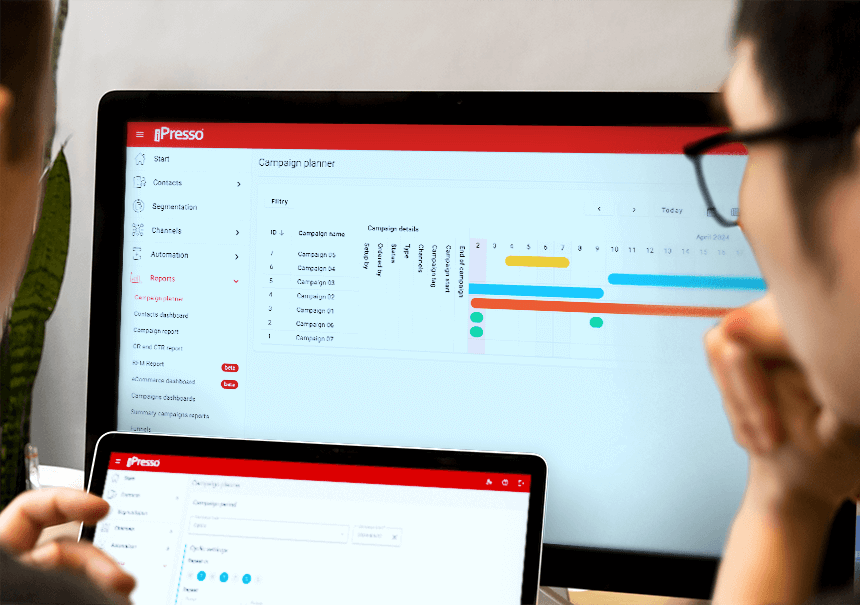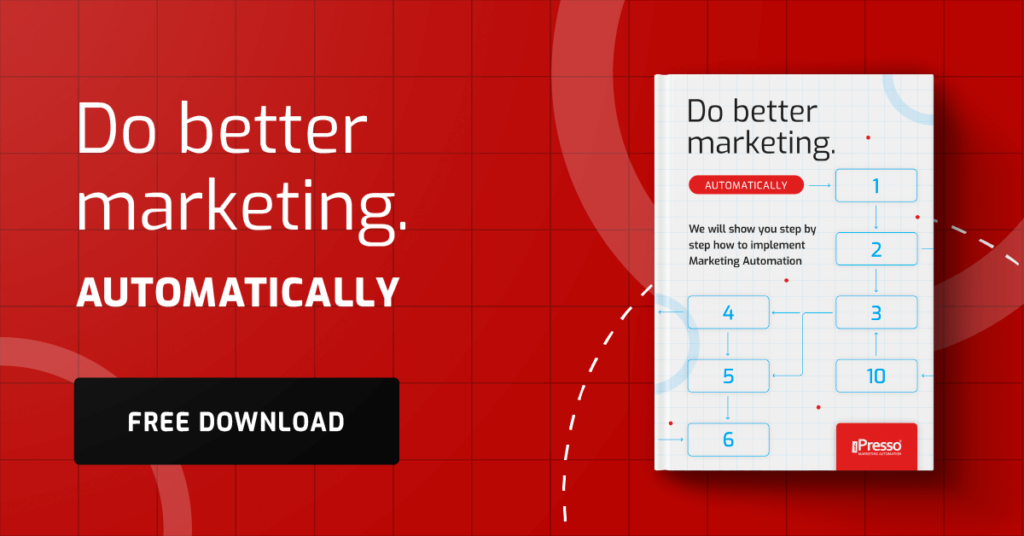Campaign planner: new iPresso functionality

Planning marketing campaigns is becoming an indispensable element of the business strategy of every organization. Effective campaigns do not arise spontaneously, but are the result of a careful process of analysis, strategy and implementation. As the market becomes more complex and demanding, so does the importance of properly planning marketing campaigns.
In this article, we will look at the main reasons why it is worth spending time and resources on planning marketing campaigns. We will understand why a strategic approach to marketing is crucial to the success of every organization, regardless of its size or industry. In addition, we will discuss the benefits of proper planning, such as increased efficiency, better resource management and building lasting relationships with customers.
The value of planning marketing campaigns
Planning marketing campaigns allows you to achieve better results by consciously choosing strategies, communication channels and promotional tools. This makes it possible to better match activities to the needs and expectations of the target group, which translates into greater campaign effectiveness.
Careful planning allows you to better manage your resources, including budget, time and people. Avoiding chaotic actions and impulsive decisions helps avoid wasting resources and minimizes the risk of failure. Well-thought-out marketing campaigns build a positive brand image and increase customer trust. Careful planning allows you to avoid mistakes and situations that could damage the company’s reputation.
The process of planning marketing campaigns requires analysis of the market, competition and target group. Thanks to this, the company gains a deeper understanding of customers’ needs, preferences and behaviors, which allows them to reach them with a marketing message more effectively.
Planning marketing campaigns allows you to think long-term and strategically. Developing a coherent marketing strategy enables you to achieve your business goals in the long run and adapt your activities to changing market and business conditions.
Campaign planning and omnichannel
The first step is a thorough market analysis and identification of target groups. It is important to understand how different market segments communicate and respond to different marketing channels. This analysis will allow you to determine which channels are most suitable for a given target group.
Based on the market and target group analysis, appropriate communication channels should be selected that will best reach the selected segments. They may be e-mail marketing, push notifications on the website, SMS, WhatsApp, messages in applications. A key element of planning cross-channel marketing campaigns is the integration of various communication channels. It is worth ensuring consistency of the brand’s message and image across all channels, which will enable building a uniform experience for customers.
Thanks to multiple communication channels, it is possible to more precisely tailor the message to different segments of the target group. The use of customer data and segmentation tools will allow you to personalize your message and increase its effectiveness.
Planning cross-channel marketing campaigns requires careful preparation, but can bring great results in the form of increased brand awareness, more conversions and loyal customers. The key is to constantly adapt the strategy to changing market and business conditions, as well as to constantly monitor and analyze the results of activities.
Campaign planner in iPresso
Planer campaign iPresso is a useful tool that allows you to effectively organize and plan marketing activities conducted through many communication channels. iPresso enables comprehensive management of marketing campaigns, ensuring consistency of message and effectiveness of activities. All these channels can be effectively coordinated and integrated within one platform, which allows for consistent and effective marketing activities.
Additionally, iPresso offers advanced message personalization functions, which allows for better adjustment of communication to the needs and preferences of various segments of the target group. By collecting and analyzing customer data, users can create more personalized campaigns that generate higher engagement and conversion rates.
Another advantage of the iPresso campaign planner is its ability to constantly monitor and analyze the results of marketing activities. Thanks to built-in analytical tools, users can track the effectiveness of individual campaigns, identify trends and quickly respond to market changes. This allows for continuous optimization of activities and maximization of return on marketing investment.
Finally, it is worth emphasizing that iPresso also offers the possibility of automating many marketing processes, which allows users to save time and resources. Thanks to automation, it is possible, for example, to plan and send personalized e-mails, manage remarketing campaigns, or conduct A/B tests.
Using iPresso, users can easily plan communication with customers in advance, using a clear calendar that allows for a clear visualization of the marketing activities schedule. Thanks to this, all planned campaigns, promotional activities and events are easily accessible to the entire team, which allows for effective coordination of activities and avoiding confusion.
As a result, planning communication with customers in advance using iPresso allows for effective management of marketing tasks, saving time and maximizing the effectiveness of activities. Thanks to a clear calendar and quick access to reports, users can work in an organized and effective way, which translates into better business results and building lasting relationships with customers.
The iPresso campaign planner uses a Gantt chart – a powerful tool that enables effective planning, management and monitoring of projects, including marketing campaigns. Thanks to its use, you can increase the efficiency of operations and minimize the risk of delays.
The Gantt chart allows you to clearly present the schedule of activities in graphical form. Thanks to this, the entire marketing team can easily understand when individual tasks are to be performed and what the relationships between them are. The Gantt chart enables effective time management by setting start and end dates for individual tasks. Thanks to this, everyone knows when they should start working on a specific task and what their priorities are. It also enables continuous monitoring of project progress. This allows you to quickly identify schedule delays and take appropriate corrective actions.



